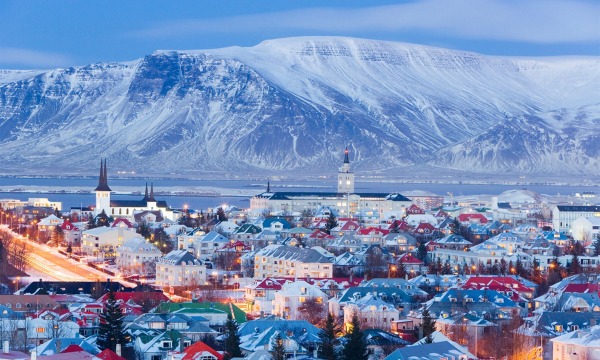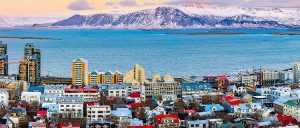Iceland : Safety by City
Warnings & Dangers in Iceland

OVERALL RISK : LOW
Iceland is a very safe country to travel to. You practically can not worry that you can be robbed or attacked. Keeping your usual common sense, you can stay safe and travel around the country at any time of the day or night.

TRANSPORT & TAXIS RISK : LOW
Public transport and taxis are safe in Iceland. They can be used at any time of the year and at any time of the day. Keep common sense and call licensed taxi services.

PICKPOCKETS RISK : LOW
Pickpockets almost never happen in Iceland. However, keep in mind that in tourist places it is better to monitor your belongings and not leave bags unattended. Also, be alert to your surroundings.

NATURAL DISASTERS RISK : LOW
Throughout the country's history, Iceland has faced a plethora of natural disasters such as "volcanic eruptions, earthquakes, oceanic floods, snow avalanches, weather, wildfires, and glacier outburst floods".

MUGGING RISK : LOW
Armed attacks and robberies in Iceland are rare and are unlikely to happen to you. However, in any case, keep common sense and evaluate the surrounding situation. Be careful in the suburbs far from cities.

TERRORISM RISK : LOW
There haven't been any terrorist attacks in Iceland's recent history. However, they shouldn't be ruled out, so remain aware of your surroundings at all times. Avoid street demonstrations, strikes, and political rallies in the streets. Examine the political situation in the country before your visit here.

SCAMS RISK : LOW
Any kind of fraud is not common in Iceland and you can be calm - it is unlikely that someone will want to deceive you in this country. In any case, of course, it is worth maintaining vigilance and acquiring tours and excursions only in licensed places.

WOMEN TRAVELERS RISK : LOW
Women traveling alone will feel utterly safe in Iceland. Ordinary common sense helps keep you safe. Avoid suspicious areas and limit your walks at night. To return to the hotel late at night it is better to use a taxi.
How Safe Is Iceland for Tourists?
Iceland is one of the safest countries in the world.
The crime rate here is meager.
There is almost no chance of getting robbed or harassed.
This, however, excludes Reykjavík, which has recently begun to suffer instances of petty theft and night-time violence.
Use common sense when sampling the night-life and be alert.
A specific danger for tourists in Iceland is found in nature.
Iceland is one of the most isolated places on the planet, always do what the signs tell you since the danger is deadly.
If there is no sign, use common sense.
Every year, quite a few tourists get injured, even die in the mountains or at the seas, usually after they have not been heard.
For example, do not approach the front of the glacier, big waves on the coast, or a large waterfall if you don’t know what you are doing and don’t walk on glaciers without proper preparation and equipment.
Iceland is a volcanically active country, and you can get into an eruption, but the chances of it are meager.
Driving around Iceland can be dangerous.
Study the local conditions and make sure that your car and driving skills are appropriate for the task.
Since the roads are tranquil and the distances between the settlements are great, some Icelanders abuse it, significantly exceeding the speed.
Do I Need a Visa to Visit Iceland?
Iceland enters the Schengen zone and many countries do not need a visa to enter Iceland for a period of fewer than 90 days. The rest of the stay is regulated as for all Schengen countries. Make sure your passport is valid for at least six months after the planned return date.
Which Currency Is Used in Iceland?
The króna or króna (sometimes called Icelandic crown; is the currency of Iceland. It has a sign: KR and code: ISK.
How's the Weather like in Iceland?
Midnight sun and warmer temperatures make summer the best season to visit Iceland. Although hikers will want to consider July and August as the best time to visit Iceland whereas February, March, September and October are typically the best time to visit Iceland for the Northern Lights
What Do I Need to Know about Airports in Iceland?
Keflavík Airport, also known as Reykjavík–Keflavík Airport, is the largest airport in Iceland and the country’s main hub for international transportation. The airport is 3.1 km west of Keflavík and 50 km southwest of Reykjavík.
Should I Get Travel Insurance for My Travels?
Just like anywhere else, the travel insurance policy is a must when visiting a foreign country. Make sure you got it before starting your journey, the customs officer may ask for it.
What Are Some Things to Do in Iceland?
Iceland is an island nation in the northern Atlantic Ocean. The relief of the country is determined by volcanoes, geysers, hot springs and lava fields. Iceland has the national parks Vatnajökull and Snajdefelsjökull, which are famous for their huge glaciers. Most of the population lives in the capital, Reykjavik, which receives a significant part of its energy from a geothermal power plant.
Is the Water in Iceland Safe to Drink?
The water quality in Iceland is above average; in fact, 97 percent of the population is satisfied with the water quality in Iceland. It is safe to drink the tap water and 95% of all water in Iceland comes from springs.
Is Uber Safe in Iceland?
There is no Uber taxi in Iceland. You can use any other taxi services in that country.

